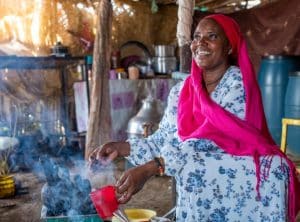Happiness and well-being are universal goals and ambitions for people all over the world. Every year on March 20, the United Nations recognizes this and marks the International Day of Happiness. The Nordic countries have often been at the top of the happiness index, which is published on that day,
Furthermore, the UN uses the day to ask that happiness and well-being be included in member states’ national plans and public policy objectives. The International Day of Happiness was initiated by Bhutan, which recognized the value of national happiness over national income since the early 1970s and prioritized the happiness of its citizens in decisions related to economic growth.

We are in an era characterized by major challenges such as war, the after-effects of a pandemic, harrowing climate change, and great inequalities in society. This causes stress, worries, and great psychological strain, and puts happiness under pressure. This is why it’s more important than ever to recognize and appreciate the value of happiness in people’s lives.
Previous results from the happiness report

In connection with The International Day of Happiness, the Sustainable Development Solutions Network publishes the World Happiness Report. This report ranks the quality of life in more than 150 countries globally and presents an index that ranks countries by how happy their populations are. The report also attempts to explain why happiness levels differ between countries. The Nordic countries tend to be at the top of the list, while Zimbabwe, Lebanon, and Afghanistan were at the bottom of the list last year.
Previous reports consistently show that individuals who are doing best are those who have good education and income, good health, supportive relationships, trust others, and experience generosity, freedom, and the absence of corruption.
“The happiest man in the world”

If one looks at Eastern and Western literature, it is evident that there is great diversity in how people define happiness. Matthieu Ricard is a Buddhist monk, writer, and photographer. Born in 1946, the son of Jean-François Revel, a well-known Franch philosopher and the painter Yahne Le Toumelin, he finished a PhD in genetics before he turned his attention to Buddhism.
He has been called the world’s happiest man by scientists who analyzed and scanned his brain activity during a 12-year study. The researchers found that he had an unusually large capacity to feel happiness, and a reduced capacity to feel negativity. Ricard gives credit to meditation and mental training for this.
According to Ricard, happiness is a deep sense of serenity and completeness, and a state that permeates and underlies all emotional states. Furthermore, he believes that the mind can be trained to be happy, and achieve true well-being, peace of mind, and completeness. He acknowledges how external factors have an impact but believes that people who have strong internal relationships even in very difficult circumstances can manage to maintain peace of mind, inner strength, inner freedom, and trust.
Measures to improve mental health and quality of life

The Norwegian Institute of Public Health presents concrete measures to strengthen mental health and quality of life. These are universal, and applicable to everyone. They can both be used by individuals, but also serve as a supporting element for structural measures. The first measure is to bond and invest in relationships so that you are part of an environment. Furthermore, the institute emphasizes the value of engaging in different types of physical activity as well as being aware and present in the moment. Another measure is to keep learning and being curious to develop as a person, as well as to contribute to the betterment of others and to a better society.
The UN Sustainable Development Goals are important for happiness
A high quality of life makes us more resilient to stress, mental ailments, and physical illness. To contribute to a future that is more health-promoting, sustainable, and fair, we must work together to ensure a good quality of life for all. This entails making efforts to end poverty, reduce inequality, and protect our planet – three aspects that are important for well-being and happiness. These goals are at the heart of several of the UN Sustainable Development Goals.






